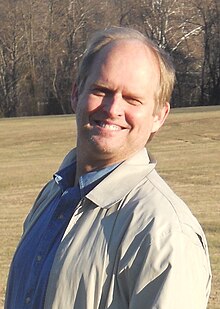Robin Hanson
Robin Hanson (born August 28, 1959 ) is an American economist . He is Professor in the Department of Economics at George Mason University in Fairfax, Virginia and a freelance research fellow at the Future of Humanity Institute at the University of Oxford . He is also the Chief Technical Officer at Consensus Point .
Life
Hanson graduated from the University of California, Irvine with a Bachelor of Science degree in physics in 1981 . At the University of Chicago , he received a Masters of Science in Physics and a Masters of Arts in Philosophy of Science in 1984 . Hanson then did machine learning research for Lockheed , worked on Project Xanadu , and studied Bayesian statistics at NASA's Ames Research Center . His Ph.D. in social sciences he graduated from Caltech in 1997 . From 1997 to 1999 Hanson conducted research in the field of health policy at the University of California, Berkeley . Since 1999 he has been a professor at George Mason University.
Hanson is married and has two sons. He describes himself as "addicted to viewquakes ", ideas that radically change the worldview. His interests include the decentralization of politics , future issues (including mind uploading , nanotechnology , cryonics , artificial intelligence , technological singularity ), fractal image format , quantum mechanics , the legalization of marijuana and the men's movement . Hanson has been the author of the blog Overcoming Bias since November 2006 .
job
Hanson developed alternative institutions in many different fields, e.g. For healthcare , law enforcement , conversations, or charity . One focus of Hanson's work is forecast markets . Hanson invented several market scoring rules that assess and reward the quality of predictions.
Futarchy
The futarchy is a modification of democracy proposed by Hanson , which is supposed to improve political decisions with the help of forecast markets . The New York Times named it a catchphrase of 2008.
functionality
Democratic votes are still used to decide which goals are to be achieved, e.g. reducing unemployment , increasing gross domestic product , improving air quality, etc. These goals must be measurable and could also be aggregated in a target index.
Once the goals have been set, forecast markets are used to decide how they can best be achieved. Policy measures can be proposed by any citizen after leaving a deposit. If a policy measure is proposed, two markets open up: One, which predicts the degree of fulfillment of the target index after the measure has been implemented, and a second, which predicts the degree of fulfillment of the target index after the measure has not been implemented. Every citizen can bet any sums or buy securities. If the resulting quotas or market prices indicate that the degree of fulfillment is higher after implementation than after non-implementation, the measure will be implemented. Ten times the deposit paid by the initiator of the measure will be refunded. The target index is measured for a predetermined period of time after implementation. Investors are rewarded based on the quality of their forecast.
Economics
Speculative markets can solve at least two problems of democracy: Firstly, misinformation and prejudices on factual issues from which democracy suffers would have less influence on political decisions than in a democratic election. Second, the incentive problem of policy advisory expert bodies in democracy could be eliminated, since in democracy these experts are neither punished for wrong advice nor rewarded for correct advice. They would be financially punished or rewarded in forecasting markets.
criticism
The economist Tyler Cowen criticizes that the goals are difficult to clearly separate from the measures.
The lawyer Michael Abramowicz criticizes that people not only have preferences for certain goals, but also for certain measures. These preferences are legitimate and are not taken into account in the Futarchy.
swell
- Grötker, Ralf (2007): To govern better. BRAND EINS 10/07 (PDF; 245 kB)
- Hanson, Robin (2009): Open-source govenment: How can we fix our political system? BBC Focus No. 206, p. August 21, 2009.
- Hanson, Robin (2007): Shall We Vote on Values, But Bet on Beliefs? (PDF; 248 kB)
- Varian, Hal (2003): A Market Approach to Politics. New York Times. May 8, 2003
Web links
Individual evidence
- ^ Leibovich, M. & Barrett, G. (2008): The Buzzwords of 2008. New York Times. December 21, 2008.
- ^ Cowen, Tyler (2007): Where do I disagree with Robin Hanson?
- ↑ Abramowicz, Michael (2007): Predictocracy: market mechanisms for public and private decision making. New Haven: Yale University Press.
| personal data | |
|---|---|
| SURNAME | Hanson, Robin |
| BRIEF DESCRIPTION | American economist |
| DATE OF BIRTH | August 28, 1959 |
